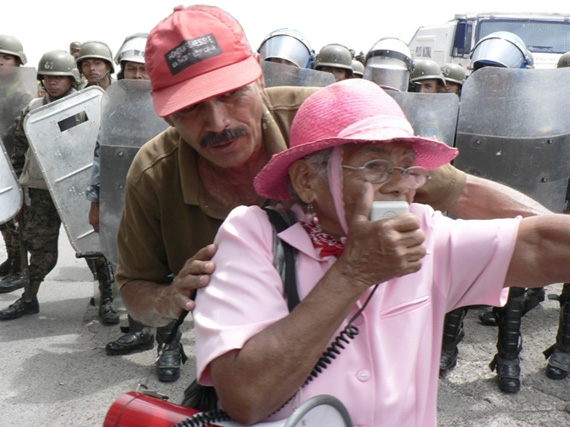|
The dialogue is at a deadlock. After yet
another dilatory proposal, the de facto
regime’s negotiating committee -which
is now pressing the Supreme Court and
the National Congress to issue opinions
on President Zelaya’s case, so the two
committees will have them before an
agreement can be reached- President Zelaya’s committee issued a statement in
which it considers this new ploy to
prevent his reinstatement as a
"formalistic, absurd and even insulting
and provocative” proposal. As the
political, economic and social crisis
continues to deepen, the dialogue is
suspended until the de facto regime
presents a serious proposal.
In spite of this difficult situation and
the alarming economic repercussions
that, for example, have led the de facto
government to cut the national budget by
60 percent, the men and women of the
Resistance continue their unceasing
mobilization, rejecting the electoral
process and its results, clearing the
streets of election propaganda and
paving the way for a Constituent
Assembly.
Men, women and children, are all keeping
their hopes high that the coup d’état
can be reverted. Whatever happens, the
people have awakened, and Honduras
will never be the same.
Among the many people who for the past
121 days have been resisting against the
gross violence of the de facto regime is
Dionisia Díaz - the resistance’s
“grandma”, as she is known by thousands
of fellow resistors.
A native of El Progreso, she was born in
1935 and participated in the great
popular uprising of 1954, spurred by a
general strike of banana workers against
the notorious United Fruit Co.
and Standard Fruit Co. Her
husband was forced to flee to the
mountains to escape the crackdown that
came after the uprising was defeated,
and she never saw him again.
Dionisia
has participated actively in the
struggle of the National Front
Against the Coup from the very first
day, and, megaphone always in hand, she
hasn’t missed a single day of
mobilization.
Sirel
took the opportunity to speak with her.
-You’ve been marching for over 100 days,
participating in each and every one of
the Resistance’s activities. What gives
you the strength to keep fighting?
-What we had here was a coup, and we
want president Zelaya to be
reinstated and the coup perpetrators and
the military out of the government. And
we want Micheletti to step down
also, because we don’t acknowledge him
as president. The military and the
economic groups put him there, and
that’s all he is: their puppet.
The people continue to take the streets
to demonstrate, and one thing is for
sure: these are not cubans
demonstrating, they’re not Venezuelans
like the de facto government claims.
It’s the Honduran people who are
marching and demonstrating, demanding
respect for their rights. This movement
that has emerged is not a purchased
movement; nobody is paying us. This
movement represents the people organized
to struggle. We’re not going to allow
this Constitution to continue standing,
because it’s doesn’t serve the interests
of the people. We’re going to keep on
fighting for a Constituent Assembly and
a new Constitution that’s made for the
people.
-Aren’t you exhausted from all that
marching, and tired of everything that’s
happened in these almost four months of
struggle?
-No, not at all. I’m as fresh as the
first day. I keep telling everyone who’s
struggling alongside me that we have to
forget the more than one hundred days
that have passed and begin each day as
if it were the first. We know what we’re
doing, what we need and what we want. I
ask everyone to unite, to overcome their
fear, and take to the streets again.
-How much longer will you be mobilizing?
-I won’t stop until president Manuel
Zelaya Rosales is reinstated. And he
better be reinstated because things are
really going to heat up if he’s not.
There can be no elections if president
Zelaya is not reinstated. And the de
facto government should know that that’s
the way it’s going to be: the people are
not going to vote. It’s that simple.
-Aren’t you afraid of all the police and
military repression?
-I’m not afraid, because in my life I’ve
seen much, much worse than what we’re
seeing today. I was born on a boat in
1935, because the river had overflowed
and my mother was unable to reach land
on time. That’s how I was born, with my
mother throwing the placenta in the
river.
In 1954 I participated in the general
strike, and I lost my husband. He went
into the mountains to escape repression
and I never saw him alive again. The
repressors chased people into the
mountains and killed them, they even
burned them alive. Now we have this
Micheletti, who’s not even honduran.
And he’s ordering police officers and
soldiers to fire at us and spray gas at
us, but we’re not backing down.
-So we’re going to keep seeing you on
the streets?
-Always. Whatever happens, that’s where
you’ll find me.
 |